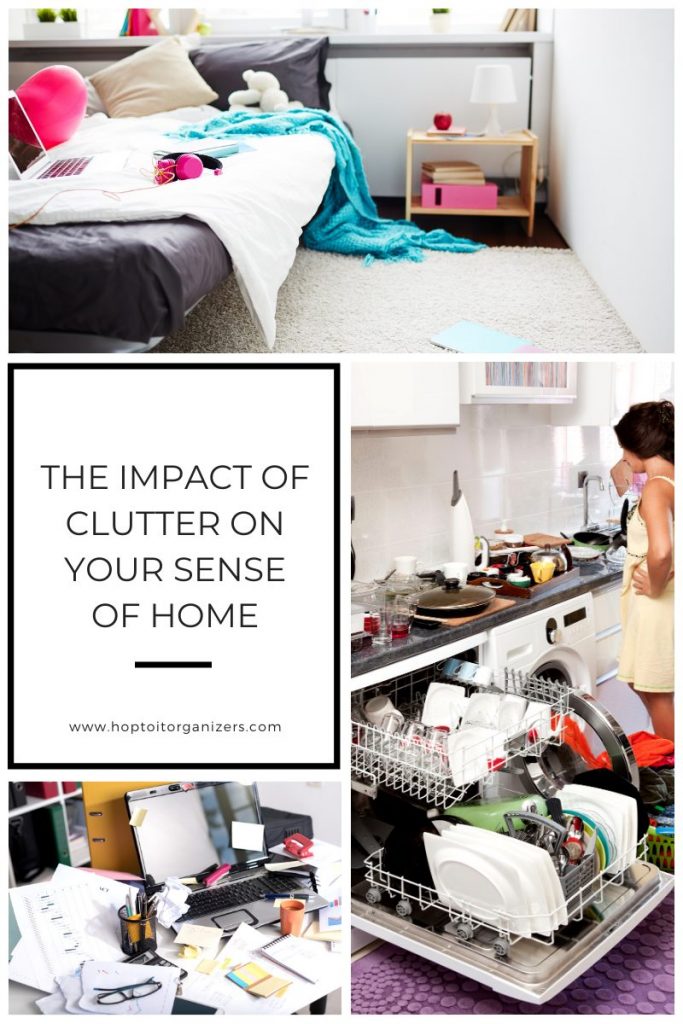How Clutter Affects Your Sense of Home

My Messy Mirror
Does clutter have an impact of your sense of home? When I was about twelve years old, I wore my heart on my sleeve. No, actually, I wore my heart on my room. At that age, I was going through a particularly tough time (who wasn’t?) and anyone walking into my bedroom could tell. My room was very often a complete and utter chaotic mess. It mirrored how I was feeling inside. I would clean it up and rearrange the furniture, and then I’d feel better. When my room was a disaster, it was a visual cue mirroring how I felt inside. Cleaning it up gave me my sense of control back.
Sometimes it was the other way around, though. Even after the hours I would spend beautifying my space, I would wake up days or weeks later and realize somehow it was back to where it started. I would then beat myself up about how I couldn’t keep anything together, and my messed up room proved it. The cycle repeated over and over.
Even though I now hold the designation of Certified Professional Organizer®, I’m still on my learning path to creating optimal spaces for myself. It’s a lifelong learning path I have the honor to share with others. Those early experiences taught me how important my environment is to my overall well-being.

The Clutter Curse
So, how does living in a cluttered home environment effect our well-being? Recent studies have uncovered the detrimental physical impacts. Continuously being in spaces which are overly and chronically cluttered raises the stress hormone cortisol in the body. In addition, too much clutter can short circuit clear thinking and hamper decision-making abilities.
What is the difference between abundance and overabundance, otherwise termed as clutter? Each person has a comfort level with what they consider clutter. In my experience, two people living in the same space rarely have the same perception of what too much clutter is. How much is too much? That can often lead to conflicts and disagreements, making home feel not as nice as you’d like it too. If you are the “clutterer”, you might be constantly feeling some level of guilt over your mess because the “non-clutterer” keeps reminding you to clean up. If you live alone, you might be both the “clutterer” and the “non-clutterer”, beating yourself up when you don’t live up to your own standards.
But It’s Important
It’s common for us to attach meaning to things. In reality, things don’t intrinsically have meaning. But our things do give us a sense of home. The sweater from college you don’t wear, but you’ve had it for so long and when you look at it you a memory flickers of all the cool nights you wore it while going out with friends. Self-identity can be tied to the physical environment and objects in your home. There are pros and cons to this. It feels good to have the memories spring up (usually), but bad when your stuff is turning into clutter.
There is a tipping point in which these possessions help to strengthen the connection to home and an overabundance of them intrudes on that connection. When the abundance (clutter) is too great it causes the home environment to be dysfunctional, chaotic, and a source of constant stress, and the sense of home is disturbed. Some clutter is okay, and most of us have some.
It’s Time to Tackle It
But, when is it too much clutter? When you can’t move normally in your space or complete regular, or everyday tasks become difficult to manage because of the abundant objects in your way, it’s a problem.
What do you do when you are overwhelmed with the sheer amount of things that you own? You probably already know how to solve this problem. It’s just stuff, so why is it so hard to let it go? It logically seems easy enough, but then why isn’t it easy?
If you break it down into tiny, laughably doable tasks, you can get it done. Begin to free yourself of the things you own that don’t support you in your life you’re living at this very moment. You’ll know when the task is small enough when you feel you could laugh at how easy it would seem to get something done. Can you declutter for one minute? Ha ha, yes, that’s silly. Of course I could do that for one minute!
You First
First, commit time. Write it on the calendar. If it doesn’t get a slot on the calendar, there’s probably a slim chance you’re going to even start. Commit time to do what? It’s time to put yourself over clutter, because you matter more than the clutter does. This is time for yourself to sit down, think, envision, write down ideas, things that are bothering you, draw a picture of your ideal end result. Make it half an hour, fifteen minutes, or five. Anything will work if it helps you to simply begin.
You don’t have to act on anything yet. Make a plan and make it as real as you can. Schedule a daily or weekly slot for yourself to visualize and plan, and eventually do the work of your plan. It’s the first step you’ll need to take to have your home, your safe zone, start to feel good the way you want it to.
Here’s your next step. You’ve allocated time on your calendar and you’ve got your plan in place. Now it’s time to use it. There’s no one right way to go about starting. Perfect has no place here. I would choose a small area such as a drawer, 3-foot square corner of a room, or an easy category and just start. Set that timer and go. Throw out the trash, recycle the papers, shred the bills, donate the stuff you don’t use. When you feel discouraged or want to quit, fight it. Are you feeling tired? Stop and start again later or the next day. Keep going because this is for you and you matter more than your clutter.
Keep Up the Good Work
This process will become familiar, like a friend. Yes, it will. This is a regular practice you’ll come to rely on. Are you surrounded by what you love, need, and use? Yes? Stop until you need refinement again. No? Do a little more or a lot more. Take a break, invite a friend to help, call in a professional organizer. Continue forward like the waves of the ocean do over the silvery sand.
I wish you much success in your decluttering journey. It is a journey like all journeys. There will be high points and low points, detours and shortcuts. Sometimes you’ll walk alone and at other times you might invite a friend to come along and help. You have your eye on the destination and the plan you made. You’re going to make your home be the one just right for you.


